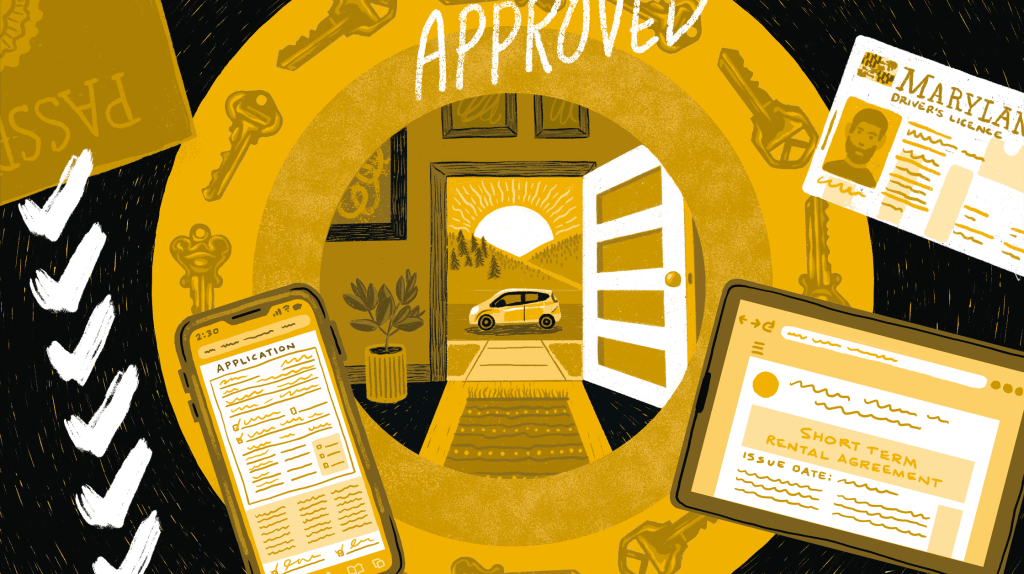Short-term rental regulation toolkit for policymakers
A best practices guide to help local policymakers develop fair and balanced short-term rental regulations for registration, transient occupancy taxes, trust and safety, and data sharing.


A best practices guide to help local policymakers develop fair and balanced short-term rental regulations for registration, transient occupancy taxes, trust and safety, and data sharing.
Illustrations by Donald Ely
A letter from Mike Signer, North America Policy Director
I’ve been excited about Airbnb ever since my youngest sister became a Host in order to afford to live in Brooklyn as a freelance writer. And as a former mayor, I saw the benefits of short-term rentals—for local folks looking to make a few extra dollars from a room in their house or a second home, for the value of the tax revenue in funding government services, and the help that tourist dollars bring to our restaurants and other small businesses.
The pandemic spread the benefits of travel from bigger to smaller cities and towns, more than 2,100 of which have welcomed their first Airbnb guests since March 2020. From Lake View, Iowa, to Wells, Maine, communities across the country and the Hosts who live there are benefitting from a travel revolution born from people becoming untethered from offices and having the ability to live and work from anywhere.
Airbnb has worked to help destinations benefit from this travel revolution by providing new tools and sharing our singular knowledge of consumer travel trends. Our policy professionals work every day with mayors, city managers, economic development directors, and city attorneys to craft rules for short-term rentals that allow locals to share their homes while meeting their communities’ needs.
I hope this new policy toolkit, designed to help local leaders take advantage of the opportunities presented by short-term rentals, can be useful in your community as you consider how to best craft fair rules that enable responsible home sharing and the benefits it can bring for residents and local economies.
Please don’t hesitate to contact me at publicpolicy@airbnb.com. We’re here to work with you.
Mike Signer
North America Policy Director, Airbnb
Former Mayor of Charlottesville, VA
Introduction
From the very start, we’ve approached policymakers as partners, not adversaries. At Airbnb, we’ve worked with thousands of governments around the world to enable responsible tourism that keeps more of the economic benefits in the places where it happens.
Airbnb is committed to working with policymakers to develop best-practice regulatory frameworks and balanced solutions to meet the unique needs of each community and help residents benefit from home sharing.
This toolkit outlines many of these best practices in partnering with local jurisdictions on short-term rental registration, transient occupancy tax, trust and safety, and data and resource sharing.
Short-term rental registration

Many local governments opt for a registration system to support compliance and enforcement of their short-term rental rules. In working with jurisdictions across the world, we have found that these guiding principles best set up a government-administered registration system for success:
- Easy and accessible: A streamlined, online registration system that allows Hosts to complete every step of the application process quickly and easily helps promote compliance. We’ve also found that compliance is greater when Hosts are able to complete a single application process that incorporates all license requirements into one.
- Reasonable data requirements: Consistent with data-protection best practices, Hosts should only be required to provide the data necessary to process an application. For example, when a Host registers their listing with a local government, they provide basic contact information to obtain a permit number. Together, the local government and Airbnb compare the registration numbers and listing urls to help promote compliance thus, limiting the amount data needed to be shared.
- Automatic renewal: To reduce their own administrative burdens, local governments should automatically renew STR registrations unless a Host decides to stop hosting short-term stays, or the short-term rental is the subject of multiple local code violations.
- Reasonable fees: All Hosts should pay a reasonable fee upon registration. Registration fees and the number of requirements should be proportional to the space and type of accommodation they share with guests.
- Reasonable onboarding: Governments can help boost compliance by offering Hosts a reasonable timeline to get registered. Ample time between the enactment of new short-term rules and enforcement allows Hosts to complete the registration process.
Airbnb can help support governments that follow these best practices with a permit field that allows registered Hosts to include their license number on their listing page. When entering a number, the Host attests that the number entered is valid and accurate. The registration number is displayed publicly on the Host’s listing page in a designated field, giving regulators the opportunity to enforce, as needed.
We also partner with local governments to educate our Host community on compliance. Airbnb will work with you to build out a “Responsible Hosting” page that includes information on how to register a short term rental in a particular jurisdiction.
Simple online registration programs provide local governments with the information they need to enforce their short-term rental rules without creating undue burdens for regular people who share their homes.
Transient occupancy tax

Since 2014, Airbnb has led the way on platform-based transient occupancy tax (TOT) collection and remittance, collecting and remitting over $7 billion to local governments around the world1. Today, we collect and remit taxes in tens of thousands of jurisdictions and the number continues to grow. These taxes help fund critical public services, with many jurisdictions choosing to direct their TOT revenue to support affordable housing, tourism promotion, and economic development.
In this uncertain economic climate, this tax revenue is more important than ever. Airbnb collects the applicable taxes directly from guests, then remits the taxes to the relevant government. This streamlines the process for our Host community and improves the experience for travelers, as well as helping to ensure that communities receive this critical tax revenue.
For this process to succeed, thoughtful consideration should be given to creating clear, modern and simple tax collection systems. As our experience in countries around the world has shown, tax systems that are complicated, costly, and fail to apply to all online and offline actors, regardless of platform, risk doing more harm than good. Complicated tax systems also discourage universal compliance by all providers in the travel sector, leaving potential tax revenue on the table for jurisdictions.
That’s why, as part of our work to streamline the collection and remittance of applicable taxes around the world, we have worked with local governments to reform existing, and implement new TOT legislation that achieves the goals of all stakeholders: government, Hosts and Airbnb. We stand ready to be a responsible, dependable partner to governments thinking about implementing tax systems, and to our Host community in achieving compliance with relevant tax laws.
What makes an effective transient occupancy tax system
A centrally collected, broadly-applicable system provides a streamlined industry-wide approach to collecting and remitting TOT to a local government. There are a number of considerations policymakers need to consider when designing a TOT system, including:
- Broad and equal application to online/offline transactions: TOT should apply equally to all online and offline business models (e.g., Airbnb, Booking, Expedia, vacation rentals). The simplest way to do this is to enact a broad definition of a “marketplace facilitator” (or at the local level, “platform” “booking agent” or “operator”), with the intention of capturing the entire accommodation industry. It’s important to bear in mind that many of the platforms in the accommodations space have different business models (e.g., some process payments and some do not). This is why it’s crucial that the law captures all models.
Platform parity is essential for effective collection and remittance of TOT. Platform parity should not only be written into law but also should be effectively enforced, with action taken against non-compliant booking platforms that are subverting the rules. This helps to discourage travelers from platform-shopping from a compliant booking platform to a non-compliant booking platform by simply switching their listing to another booking platform operator. It also helps to ensure that all possible TOT is collected.
If platform parity is not possible, jurisdictions should, at a minimum, require price display parity whereby all advertisements, offline or online, are required to display the tax within the final total price before checkout, even if the particular platform isn’t obliged to collect the tax. This preserves competitive parity between various players and, more importantly, protects would-be guests against “surprise” taxes after they have completed their transaction.
- Centralized collection (State): TOT collection should be as centralized as possible to minimize compliance burdens and costs for industry and government alike. Platforms can still provide the state government with a local breakdown of taxes collected and remitted on the return so the government can distribute the funds accordingly. Centralization of tax administration is the key to full compliance by all parties in travel.
- Equal treatment of short-term rentals and “traditional” hospitality: STRs should pay the same TOT rate as “traditional” accommodation providers such as hotels, motels, and bed and breakfasts. This is not only fair, but will improve compliance for platforms given that many have various types of accommodations listed.
- Minimize compliance burdens for Hosts and platforms: Best-in-practice systems simplify adding administrative requirements of both hosts and platforms, avoiding burdens such as tax account registration, multiple tax filings, and/or the sharing of large amounts of information including personally identifiable information (PII).
- Carve out for professional Hosts: If the law requires platforms to collect and remit taxes for all Hosts, (i.e., it does not exempt certain types of hosts), then all hosts, including hotels and professional operators, will be forced to amend their normal collection and remittance processes and associated tax compliance to reflect that platforms have collected and remitted on their behalf. This creates havoc for them with their own internal processes. A carefully crafted TOT ordinance will allow certain hosts to continue to use their own systems without impacting the overall amount of tax remitted.
- Impose tax on appropriate base: Ensure that the tax base is based on the amount charged for the stay by the operator, not on the amount the guest pays to complete the transaction, which includes fees imposed by the platforms/managers. This helps keep the overall cost of tourism down.
- Privacy and data minimization: Consistent with data protection best practices and public safety, there is no justification for a public database of registered hosts or listings. Data protection laws should be followed strictly, and data collected for tax purposes should not be shared within a government for other purposes (e.g., immigration checks, short-term rental investigations, etc).
Trust and safety

With over 1.4 billion all-time guest arrivals in 220+ countries and regions, Airbnb has thrived because it is built on trust. We earn and keep that trust by focusing on building a platform that allows millions of strangers to trust one another, and promoting the safety and peace of mind of our community as they live, work, travel and host on Airbnb. A key part of this work involves partnering with cities and offering resources to help prevent and manage concerns in their community.
In recent years, we have taken proactive measures to collaborate with cities and promote neighborhood safety and quality of life by implementing the following:
- A ban on disruptive and unauthorized parties, pursuant to our community disturbance policy as well as maintained a prohibition on party houses2.
- Reservation screening technology to block certain bookings that are potentially higher risk for disruptive and unauthorized parties, to try to reduce the risk of disruptive and unauthorized parties, as well as enhanced measures around holidays.
- A 24/7 Neighborhood Support Line to give neighbors the ability to communicate directly with us.
- Support for policymakers and law enforcement to take action in the event of issues, including a dedicated portal for law enforcement to submit valid legal requests for information from us, available in nine languages.
- Partnering with Vrbo, an Expedia Group company, to develop the Community Integrity Program, an industry collaboration to strengthen action on the community threat of repeat “party house” offenders. Airbnb and Vrbo developed a process that identifies properties permanently removed from each platform due to repeated violations of respective policies, so each company can take appropriate action.
To give Hosts tools to help keep their properties and communities safer, we have implemented the following:
- A double-blind review system — meaning users don’t see the reviews they’ve left for each other until they’re both published on their public profiles – that facilitates authentic, transparent feedback our community can trust.
- Giving Hosts the ability to assess reviews of guests before accepting bookings and to limit bookings only to guests with positive reviews.
- Offering Hosts free or discounted noise sensors to help deter noise and nuisance while respecting guest privacy, as well as free combination carbon monoxide detectors and smoke alarms to active, qualifying Hosts.
- Education campaigns, such as our campaign on pool and fire safety, in partnership with members of our Trust and Safety Advisory Coalition, that includes expert tips and guidance for Hosts.
And in the rare case of an issue, we strive to act quickly to help:
- Our 24/7 Safety Line offers assistance to Hosts and guests
- Our in-app Local Emergency Services feature quickly connects users to local emergency services.
- We may suspend or ban people who violate our policies, such as by throwing a disruptive party in a listing.
- We may suspend or remove listings that fail to meet quality standards or cause severe neighborhood disturbances.
- Our global Community Support team serves Hosts and guests in multiple languages, and we have a specialized team to work with local law enforcement when necessary.
On top of our work with cities, we have implemented a series of initiatives and programs to further promote the safety of our consumers and community. These include:
- Ongoing identity verification for Hosts and guests. Airbnb requires every booking guest and every primary Host getting booked to be verified. More can be found here.
- Background checks in the US. As part of our efforts to protect our community, we run standard criminal background checks for Hosts and guests in the US. More information can be found here.
- Partnering with expert organizations through our Trust and Safety Advisory Coalition (TSAC) to advise on our policies, processes, training and community education. More information can be found here.
- Secure messaging and account protection measures. We do our best to promote the online safety of our community. For example, we’ll block potentially suspicious messages that contain words or numbers that might include contact information or references to other sites, including external links.
- Extensive fraud and scam prevention efforts, including secure payments through our platform, specialized fraud prevention agents and 24/7 support teams to help deter scams and financial fraud
- A dedicated safety-focused Solo Traveler Safety feature to guests traveling solo in a private room on Airbnb. More information can be found here.
Data and resource sharing through the City Portal

In 2020, to scale our work with governments around the world, Airbnb introduced the City Portal – a first-of-its-kind resource for local governments and tourism organizations informed by years of work with governments around the world. After launching the City Portal with 18 pilot partners, today, more than 350 cities and tourism organizations – from Sacramento to Raleigh – have partnered with us to access this unique resource.
The City Portal offers local leaders insights into Airbnb in their community and tools to help enforce their laws. Specifically, the City Portal’s technology offers governments and tourism organizations the following:
- Local and global Airbnb data insights into short-term rental market characteristics. For example, tourism organization partners can see where guests are coming from and adjust marketing accordingly.
- TOT revenue data in jurisdictions where Airbnb is collecting and remitting on behalf of the Host.
- Centralized access to the Airbnb Neighborhood Support hotline and Law Enforcement portal. An official who needs to reach our law enforcement support team because of a safety incident can more easily find the applicable tool via the Portal.
In addition, the City Portal offers government and tourism partners access to an Airbnb team member who can help provide one-to-one support with the City Portal or issues that arise locally. For example, if an official has a question about our rules against both parties and “party houses,” they can easily reach Airbnb staff.
Conclusion
The resources in this toolkit reinforce our commitment to working with policymakers and help ensure short-term rentals serve and strengthen the communities in which we operate. As travel continues to spread beyond traditional urban centers, our hope is that Airbnb can help more towns and cities benefit from tourism—both by offering residents a new way to earn extra money and expanding revenue sources to support local economies.
We understand that each community has different needs and priorities, which is why we work with governments around the world to develop fair rules that encourage responsible home sharing. If you have questions about any of the resources included in this toolkit or would like to work with us on bringing the benefits of travel and tourism to your community, please reach out at publicpolicy@airbnb.com.
Appendix: Case studies and model ordinances
Alexandria, VA
In Alexandria, every STR property must be registered annually with the Department of Finance within 30 days of the property being offered for rental. The registration process is simple and free. If the STR operator has revenue greater than $10,000 annually, and they rent more than four separate dwelling units, they must obtain an additional Business, Professional and Occupational License (BPOL). This approach empowers residents who share their home on an occasional basis to earn supplemental income without unnecessary regulatory barriers. Typical zoning or permitting provisions like maximum occupancy rules apply to STRs however, there are no zoning or permitting approvals specific to STRs. Alexandria’s STR ordinance can be found here.
Raleigh, NC
Raleigh, NC has embraced STRs as a way to boost tourism and their local economy. The City’s registration system requires STR Hosts to procure a zoning permit from the City. The zoning permit number authorizing the STR must be posted on all advertisements. STRs are allowed in all residential zoning districts and there is no limit to how often Hosts can rent space in their homes. The City also allows STRs in accessory dwelling units (ADUs), and enforces short-term rental rules on a “complaint basis”. Within six months of the regulations going into effect, the City reported having received only one complaint.
Tulsa, OK
Tulsa, OK recognizes that STRs play a substantial and positive role in the community. The ordinance requires an annual license for each short-term rental with a total fee of $375 renewed annually and classifies STR’s into two categories: Principal Use STR and Accessory Use STR. A Principal Use STR is a dwelling unit that is not the primary residence of a household and an Accessory Use STR is the primary residence of the household. The ordinance requires a local contact person who can be reached by the City 24 hours a day. Under the law in Tulsa, it is the responsibility of the STR operator to prevent nuisance behavior and maintain neighborhood peace and quiet. They require the license to be posted within the interior of the rental. STR operators who have properties with 5 or more rooms are required to collect a lodging tax of 5% from guests and remit to the city. Before this ordinance, all short-term rentals were required to go before the City Board of Adjustment for approval.
Midland, TX
Midland, TX passed a simple ordinance that only requires STR operators to collect and remit an 7% occupancy tax on the price of the rental.
Richardson, TX
Richardson defines a STR as a residential property that is rented wholly or partly for a fee for a period of less than 30 consecutive days. They require an annual registration with a fee of $75. They require materials to be posted at the STR location including this helpful neighborhood information guide. Visitors must comply with the existing noise ordinance and the city has a 24-hour response line for neighbors to report issues.